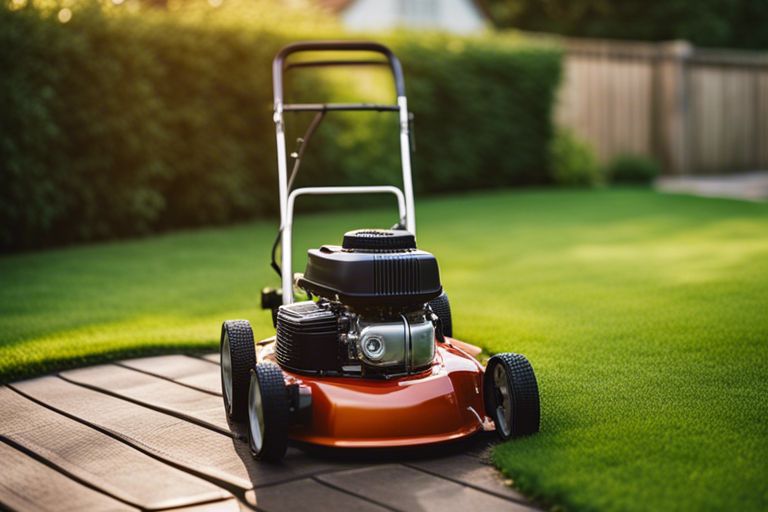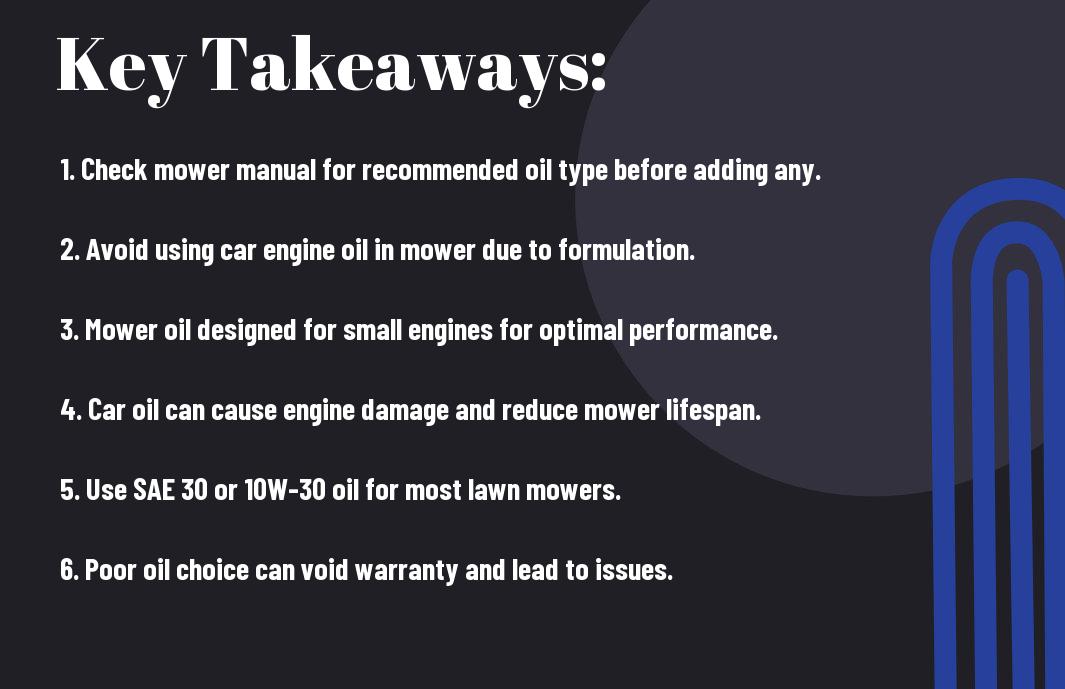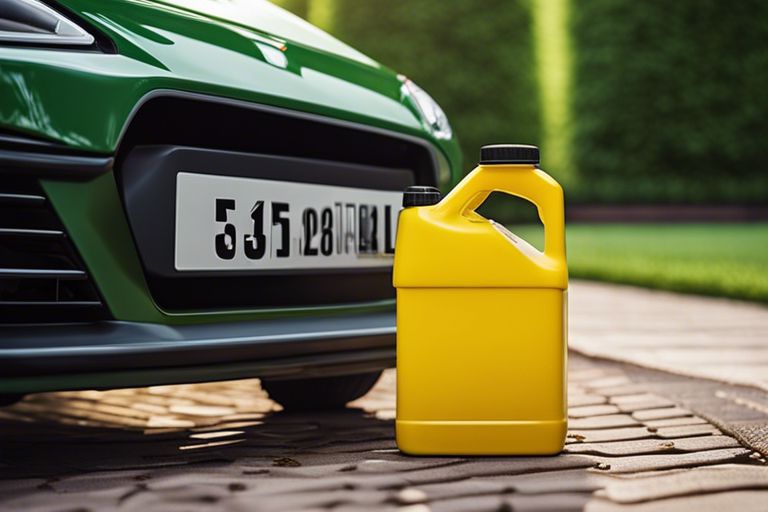Over time, it’s common for lawn mower owners to wonder if car engine oil can be used as a substitute in their trusty machines. The answer to this question is crucial, as the type of oil used directly impacts the performance and longevity of your mower. In this informative guide, we will probe into the compatibility of car engine oil in lawn mowers, discussing the potential risks and benefits associated with this substitution. Understanding the nuances of oil selection is important for maintaining your lawn mower in optimal condition, so let’s explore whether car engine oil is a suitable choice for your outdoor equipment.

Key Takeaways:
- Not Recommended: Putting car engine oil in a lawn mower is generally not recommended as it may not provide optimal performance or protection for the engine.
- Use SAE 30: Lawn mowers typically require a specific type of oil, such as SAE 30, to ensure smooth operation and longevity of the engine.
- Consult Manual: It is important to consult the owner’s manual of the lawn mower to determine the correct type and viscosity of oil to use for optimal performance.

Understanding Engine Oil
Types of Engine Oil
If you are wondering whether you can use car engine oil in your lawn mower, it’s imperative to understand the different types of engine oil available. There are mainly two types: conventional and synthetic. Conventional oil is derived from crude oil, while synthetic oil is man-made with higher quality additives for improved performance. When considering which type to use, always refer to the manufacturer’s recommendations to ensure optimal engine performance.
Assume that the manufacturer suggests using synthetic oil for your lawn mower, as it may provide better protection and performance, especially in extreme conditions.
| Engine Oil | Conventional |
| Source | Crude oil |
| Benefits | Cost-effective |
| Performance | Decent in moderate conditions |
| Potential Issues | May break down faster in high temperatures |
Viscosity and Specifications
For optimal engine performance, it’s crucial to understand viscosity and specifications when choosing engine oil for your lawn mower. Viscosity refers to the oil’s thickness at different temperatures, with lower viscosity oils flowing better in cold weather and higher viscosity oils maintaining better lubrication at high temperatures. Specifications such as API (American Petroleum Institute) and SAE (Society of Automotive Engineers) ratings indicate the oil’s quality and performance level.
Engine manufacturers provide specific viscosity and API/SAE ratings for their engines to ensure proper lubrication and protection against wear and deposits.

Lawn Mower Engine Requirements
Differences Between Car and Lawn Mower Engines
Now, it’s important to understand that car engines and lawn mower engines are designed for different purposes and operate in different ways. Lawn mower engines are typically smaller in size and have simpler designs compared to car engines. They also tend to run at higher RPMs to power the blades efficiently. Using the wrong type of oil can lead to serious damage to your lawn mower engine.
Recommended Oil for Lawn Mowers
To ensure optimal performance and longevity of your lawn mower, it is crucial to use the recommended oil for lawn mowers. Typically, lawn mowers require a specific type of oil that is formulated to handle the high temperatures and high RPMs that these engines operate at. Using the wrong type of oil can result in poor performance, increased wear and tear, and even engine damage.
Lawn mower engines often require SAE 30 or 10W-30 oil, depending on the temperature and climate conditions in which they will be used. It is important to consult your owner’s manual to determine the correct type of oil for your specific lawn mower model.
Risks and Consequences
Potential Damage from Using Car Engine Oil
Many individuals may consider using car engine oil in their lawn mower as a quick fix due to its availability, but this can result in severe damage to the mower’s engine. An inappropriate oil viscosity or additives in car oil can lead to increased wear and tear on the engine components, ultimately reducing the lifespan of the lawn mower.
Long-term Effects on Lawn Mower Performance
An important risk to highlight is the long-term impact on the overall performance of the lawn mower. Using car engine oil may cause buildup of deposits and sludge in the engine, leading to decreased efficiency and potentially overheating issues. Furthermore, the wrong type of oil can negatively affect the lubrication of engine parts, causing premature wear and tear.
Longterm: It is crucial to prioritize the use of the manufacturer-recommended oil for your lawn mower to ensure optimal performance and longevity. Regular maintenance, including oil changes with the correct type of oil, is key to preserving the health of your lawn mower and avoiding costly repairs in the future.
Best Practices for Lawn Mower Maintenance
Selecting the Right Oil for Your Lawn Mower
One of the crucial aspects of lawn mower maintenance is selecting the right oil. It is crucial to use oil specifically designed for small engines like those found in lawn mowers. Typically, you should use SAE 30 for warmer temperatures and SAE 10W-30 for varying temperatures.
Regular Maintenance Tips
- Change the oil regularly, following the manufacturer’s recommendations.
- Clean or replace the air filter to ensure proper air flow.
- Check and replace spark plugs as needed for optimal performance.
Selecting the right oil is just one part of the equation; regular maintenance is also crucial in keeping your lawn mower running smoothly. Changing the oil, cleaning or replacing the air filter, and checking and replacing spark plugs are simple tasks that can significantly impact your lawn mower’s performance and longevity. Recognizing the signs of wear and tear can help prevent costly repairs down the line.
Practices for Lawn Mower Maintenance
- Inspect and tighten any loose bolts or nuts.
- Sharpen the mower blades regularly for a clean cut.
- Store your lawn mower in a clean, dry place to prevent rust and damage.
To ensure your lawn mower operates efficiently, implement these maintenance practices as part of your routine. Regularly inspecting and tightening loose bolts, sharpening the mower blades, and storing the equipment properly can extend its lifespan and maintain its performance. Recognizing any issues early on can prevent more significant problems later.
Final Words
Conclusively, using car engine oil in a lawn mower can have detrimental effects on its performance and longevity. The viscosity and additives in car engine oil are not suitable for the high temperatures and constant fluctuations in a lawn mower engine. It is always recommended to use the type of oil specified in the manufacturer’s guide for optimal functioning of your lawn mower. By following the manufacturer’s recommendations, you can ensure that your lawn mower continues to operate efficiently and effectively for years to come.
FAQ
Q: Can you put car engine oil in a lawn mower?
A: No, it is not recommended to use car engine oil in a lawn mower. Lawn mowers require a specific type of oil that is designed for small engines to ensure proper lubrication and performance.
Q: What type of oil should I use in my lawn mower?
A: It is best to use SAE 30 or SAE 10W-30 oil in your lawn mower. Always refer to your lawn mower’s manual to determine the correct type of oil recommended by the manufacturer.
Q: Can using the wrong type of oil damage my lawn mower?
A: Yes, using the wrong type of oil in your lawn mower can lead to poor lubrication, overheating, and potential engine damage. It is important to always use the recommended oil to ensure optimal performance and longevity of your lawn mower.
Q: How often should I change the oil in my lawn mower?
A: It is generally recommended to change the oil in your lawn mower after every 25 hours of use or at the beginning of each mowing season. Regular oil changes help maintain the engine’s performance and extend its lifespan.
Q: What are the signs that indicate it’s time to change the oil in my lawn mower?
A: Some signs that indicate it’s time to change the oil in your lawn mower include dark or gritty oil, engine knocking or ticking sounds, decreased engine performance, or smoke coming from the exhaust. If you notice any of these signs, it is important to change the oil promptly.
